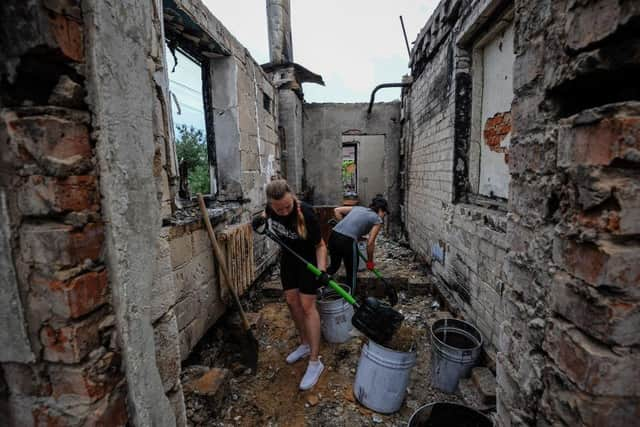Ukraine conflict: Fears of Russian escalation on eve of Ukraine’s national day
The United States reinforced the worry when its embassy in Kyiv urged US citizens still in Ukraine to depart the country immediately.
The State Department issued a security alert, saying it “has information that Russia is stepping up efforts to launch strikes against Ukraine’s civilian infrastructure and government facilities in the coming days”.
Advertisement
Hide AdAdvertisement
Hide AdThe US warning came on the heels of Russia claiming that Ukrainian intelligence was responsible for a weekend car bombing outside Moscow that killed the daughter of a leading right-wing Russian political theorist. Ukraine denied involvement.
Hundreds of people lined up at a memorial service to pay tribute to Darya Dugina, 29, the daughter of Alexander Dugin, a nationalist writer whom the media have dubbed “Putin’s brain” and “Putin’s Rasputin” due to his purported influence on Russian President Vladimir Putin.
Ms Dugina, a commentator with a Russian TV channel, died when the SUV she was driving blew up on Saturday night as she was driving home from the patriotic Tradition festival.
Her father, a philosopher firmly behind Mr Putin’s decision to send troops into Ukraine, was widely believed to be the intended target.


During the memorial service held at a Moscow broadcasting centre, Mr Dugin remembered his daughter’s last words to him at Saturday’s festival: “Father, I feel like a warrior, I feel like a hero. I want to be one, I don’t want any different fate. I want to be with my people, with my country.”
Russia’s accusations that Ukraine was behind Ms Dugina’s killing heightened the apprehension in Ukraine. The Kyiv regional government banned mass events in the capital from August 22 to 25 due to what it said was “the high probability” of Russian missile attacks on the city during the week of Independence Day, spokesperson Kateryna Datsenko said.
The intelligence division of Ukraine’s Defence Ministry also warned Kyiv residents to be cautious, especially on Independence Day and not to ignore air raid sirens.
While visiting destroyed Russian tanks and artillery on display near the capital’s main square, Kyiv resident Vlad Mudrak said he agreed with the ban on mass gatherings.
Advertisement
Hide AdAdvertisement
Hide Ad“Our country is having a very hard time, and we need to be careful,” Mr Mudrak, 26, said on Tuesday, which was Ukrainian Flag Day.
“Look how many weapons they have,” he said, standing next to a burned-out tank and multiple rocket launcher. “And that’s nothing, not even 1%.”
Ukrainian President Volodymyr Zelensky mentioned the threat potential over the weekend, when he said in a nightly address that “we should be aware that this week Russia may try to do something particularly nasty, something particularly cruel”.
On Tuesday, however, Mr Zelensky stressed defiance rather than worry when he raised the national flag at a memorial.
“The blue and yellow flag of Ukraine will again fly where it rightfully should be. In all temporarily occupied cities and villages of Ukraine,” he said, including the Crimea Peninsula which Russia annexed in 2014.
One potential target fuelling a sense of foreboding is Europe’s largest nuclear power plant, located in south-eastern Ukraine, where continued shelling and fighting in the area has raised fears of a nuclear catastrophe.
UN Secretary-General Antonio Guterres warned about the nuclear threat in general, particularly since Russia alluded to its massive nuclear arsenal early in the war.
Mr Guterres demanded a halt to “nuclear sabre-rattling”, saying the world is at a “maximum moment of danger” and all countries with nuclear weapons must make a commitment to “no first-use”.
Advertisement
Hide AdAdvertisement
Hide AdThat did not prevent shelling close to the Zaporizhzhia Nuclear Power Plant early on Tuesday.
Regional governor Valentyn Reznichenko said Russian forces fired on nearby Marhanets and Nikopol on the right bank of the Dnieper River, continuing weeks of relentless overnight shelling.
According to an intelligence update from the Ministry of Defence (MoD) Russian forces in Dnipro started to construct a floating bridge as a result of the damage to the Antonivsky Bridge.
The update from the MoD read: “Over the weekend, Russia probably started moving barges into position to construct a substantial floating bridge over the Dnipro river, immediately beside the damaged Antonivsky road bridge. The crossing is the key link between Russian-occupied Kherson and the east.
"For several weeks, Russian forces and local civilians have relied on a ferry crossing of the waterway. If Russia completes the improvised bridge, it will almost certainly increase the capacity of the crossing point compared to the ferry.”
The update added: “A floating bridge would likely still be vulnerable to Ukrainian offensive action.”
Another source of concern was the fate of Ukrainian prisoners of war. UN High Commissioner for Human Rights Michelle Bachelet said she was “concerned by reports that the Russian Federation and affiliated armed groups in Donetsk are planning — possibly in the coming days — to try Ukrainian prisoners of war”.
She said it is being labelled an “international tribunal” but that due process and a fair trial would not be guaranteed.
